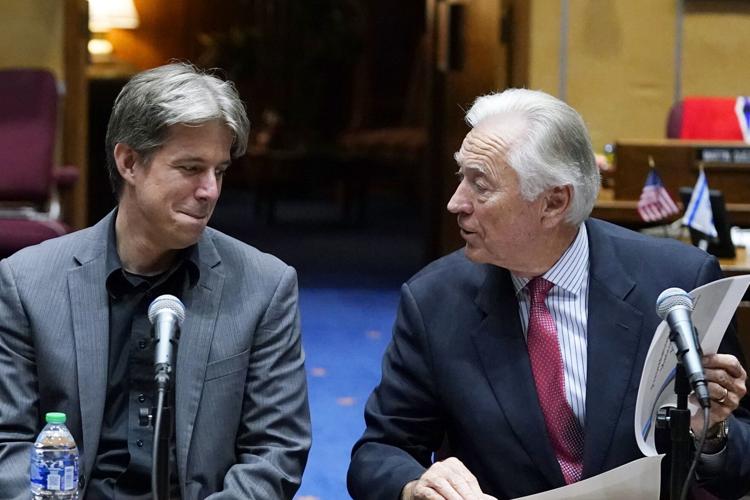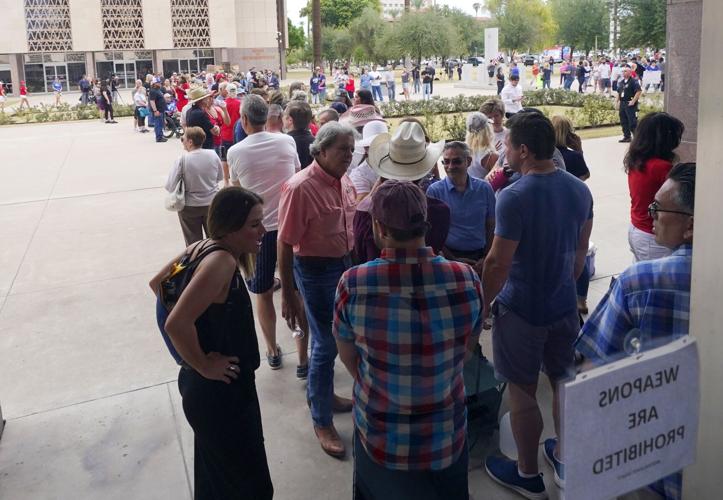PHOENIX — The Senate’s long-awaited audit report formally confirmed Friday that Joe Biden defeated Donald Trump in Arizona’s largest county, and found no evidence of fraud in the 2020 election.
Doug Logan, CEO of Cyber Ninjas, said the hand count his firm performed with volunteers found 1,040,873 votes for Biden, which is actually 99 more than the official Maricopa County tally.
By contrast, the audit tallied 995,404 votes for the former president, 261 less than the county found.
But the individuals and companies hired by the state Senate to conduct the review told lawmakers in Friday’s presentations that the ballot tally does not address other issues about how the election was conducted. They said that brings the accuracy into question. Election officials, however, said the auditors didn’t understand election procedures.
Senate President Karen Fann said it’s not a surprise the auditors found no fraud. “You can’t prove it by just an audit,’’ she said, saying fraud refers to intentional malfeasance.
“We can’t prove that there were intentional actions that caused these problems,’’ the Prescott Republican said. “We do know that there were intentional problems that need to be fixed.’’
Nonetheless, Fann said the report is being turned over to the office of Republican Attorney General Mark Brnovich to investigate.
Trump, who has repeatedly claimed without evidence that the election was stolen, issued a statement Friday contending the audit “shows incomprehensible fraud at an election changing level.”
“Arizona must immediately decertify their 2020 presidential election results,’’ he said, though no one, including Trump, has explained how that would even be a legal possibility.
Every Arizona judge who has heard the claims of the former president and his allies has dismissed them as lacking evidence, and a state-mandated hand count of a random sample of ballots previously found no irregularities.
Fann said the goal of the audit ordered by Senate Republicans was never to change the election results, but to examine the procedures and identify problems.
She said the report will also lead to proposed legislation to update election laws, with a possible special session to be called for the Legislature before lawmakers are scheduled to return in January.
The recommendations range from regular audit procedures, to having ballots on “official paper’’ that are specially watermarked to prove they are authentic. The report also proposes to make public the images of every ballot cast — removing any way of identifying who cast it — “for increased transparency and accountability in the election process.’’
And Logan said that if Arizona decides to continue to allow people to vote early, which he does not recommend, there should be better methods to ensure the identity of those who are casting those ballots.
A parade of witnesses presented the findings Friday in the Senate chambers.
Shiva Ayyadurai, hired as a handwriting expert, told senators he found a series of “anomalies,’’ ranging from ballots without signatures that were counted, to cases where there were duplicate votes from what apparently were the same voters.
“Why are blanks being stamped as verified and approved?’’ he asked. “The signature verification process is unverifiable.’’
Ayyadurai acknowledged he had no answers.
But Megan Gilbertson, spokeswoman for the Maricopa County Recorder’s Office, told Capitol Media Services there is a simple explanation: Ayyadurai reviewed all the ballots scanned, not the ballots counted.
For example, she said, every early ballot envelope is scanned when it comes in.
If a signature does not appear to match, her office tries to contact the voter. If there is an explanation for a mismatch, such as a signature changed after a voter suffered a stroke, then the ballot is rescanned.
So, there would be two ballot images, Gilbertson said, but only one was counted.
Ditto, she said, of situations where there is no signature: The original ballot envelope is scanned — but not counted — and then the one that someone comes in and signs also is scanned, with only the latter one counted.
Gilbertson said the audit finding of 23,344 mail-in ballots voted from a prior address also is flawed.
She pointed out that Cyber Ninjas used not official county voter files, but a commercial program from a company called Melissa.
“We can’t attest to the completeness or accuracy of the Melissa website,’’ Gilbertson said. In fact, she said, there is no real-time commercial database of voter registration that tracks day-by-day changes of where people live.
“People are allowed to move from one house to another even during the election,’’ she said. “If the driver’s license matches the voter registration address, they’re still allowed to vote.’’
And Gilbertson pointed out that the post office will not forward mail-in ballots to any other address.
The report also said the reviewers found 10,342 potential voters that cast ballots in multiple counties. That was based on what Logan said were a comparison of people with the same first, middle and last name, and birth year.
“While it is possible for multiple individuals to share all these details, it is not common, and this list should be fully reviewed,’’ the report says.
Gilbertson said she can’t say what happened in other counties. But here, too, she said Cyber Ninjas was working with insufficient information.
“It’s incredibly possible that voters would share the same name and year of birth,’’ she said. “Think of all the John Smiths and Maria Garcias in Arizona,’’ Gilbertson said. She said the Senate — and the auditors — had access to some voter files with the actual date of birth, not just the year, to make comparisons, but did not use them.
Secretary of State Katie Hobbs, a Democrat, said there are “robust systems’’ to prevent and detect duplicate votes.
“Whatever the Cyber Ninjas were using to come up with this list of duplicate voters is not comparable to the systems we have in place,’’ Hobbs said.
Logan himself acknowledged some potential flaws to his report, such as the claim that there were 3,432 more ballots received than people who were listed as voting. He said one reason is that the voter registration files do not include people with protected addresses like judges and victims of domestic violence.
Logan’s conclusions and findings have been questioned before, and not only because his firm has never done such a review before.
For example, Logan said in July there were 74,243 mail-in ballots being received “where there is no clear record of them being sent.” Logan also said there were 11,326 individuals who did not show up on the version of the voter rolls prepared the day after the election but did show up on the Dec. 4 list as not only being registered but having voted.
County officials responded with a point-by-point rebuttal. And Logan has made no claims like that since.
Ben Cotton, founder of CyFIR, a computer security firm, told lawmakers that he wanted to check to see whether election equipment was connected to the internet.
“Given the lack of access, I cannot do that at this time,’’ he said. Cotton said that should be possible after the county, under an agreement with the Senate, makes its computer routers accessible to security experts retained by a “special master.’’
Maricopa County officials say that two separate audits they conducted both showed no internet connection. But Fann has argued that neither was the kind of “forensic audit’’ the Senate wanted.
Cotton also questioned the timing of some election files that were deleted, calling it “a bit suspect.’’
“There may be a plausible explanation,’’ he said. “I simply can’t know at this point.’’
He said that videos of the county election offices show employees at the keyboards during the times files disappeared.
“Some individual went into an application and they chose to run something that would clear all the records that were in a system the day before the audit started,’’ Logan added.
But no one explained the relevance of that, particularly given that the auditors had the actual ballots which verified that Biden outpolled Trump in Maricopa County. More to the point, politically, Biden did it by a large enough margin to offset Trump’s support in rural counties, giving the Democrat the state’s 11 electoral votes.
Gilbertson said the claims about election files show a lack of understanding of elections. “We have archival procedures for our elections related to the November election,’’ she said.
The reason, she said, is there is only limited storage capacity on the server and the county had to do routine cleanup and deletion of files to make space to run local elections in 2021.
Some doubts about the veracity of the audit were raised because of the fact that the $150,000 the Senate agreed to pay Cyber Ninjas came nowhere close to covering the actual costs. Logan, who had made comments about fraud in the election even before the audit started, acknowledged earlier this year that he had collected about $5.7 million from outside sources, most with links to Trump or his supporters.
The presentation Friday occurred against a backdrop of demonstrations and speeches near the Capitol by people who identified as both supporters of the former president and in opposition to vaccines. Many of these people then filled in the approximately 100 seats available to the public in the gallery.






